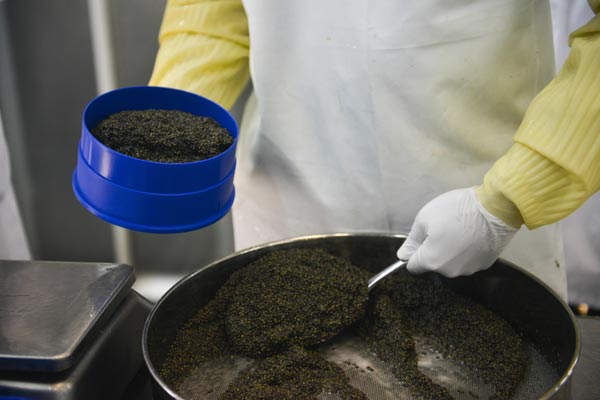'Black gold' a China treasure
By Zhang Kun ( China Daily ) Updated: 2014-12-06 09:34:37
 |
|
Kaluga Qeen carviar, grown in the farm of Qiandaohu in Zhejiang province. Photo provided to China Daily |
The high price led to over-fishing, and after fishing for wild sturgeon was banned, a black market emerged, and eventually some fine restaurants and hotels had to remove caviar from the menu.
Scientists in China have researched the farming of sturgeons for many years. They discovered China's own wild sturgeon species named Kaluga, and cultivated hybrid sturgeons that combine the advantages of Kaluga and Amur sturgeon from Sino-Russia border.
Kaluga Queen is a successful fruit of their research. In 2003, the company brought some half-grown fish from the China Academy of Marine Science in Beijing to start its own fish farm on Qiandaohu.
Qiandao Lake is a reservoir built in the 1950s as part of a hydropower station. There is no industrial pollution and 87 percent of the land is covered by natural forests.
The water quality of Qiandaohu is so fine that in summertime the visibility underwater can reach as deep as 7 meters.
Kaluga Queen is the only company to pass the environmental evaluation to gain the license to build a fish farm on the lake.
Visiting clients and distributors can see clearly the sturgeons swimming in the giant tanks underwater.
"We have waste collecting systems to stop the excrement and leftover fish feed from polluting the lake," Han says. "And we don't need to put any drugs in the water."
The fine water quality has kept the fish healthy. Once they grow beyond three years, more than 99 percent of the sturgeons will survive till they bear eggs.
|
|
|
|
|
|
|
|

























 Raymond Zhou:
Raymond Zhou: Pauline D Loh:
Pauline D Loh: Hot Pot
Hot Pot Eco China
Eco China China Dream
China Dream China Face
China Face






